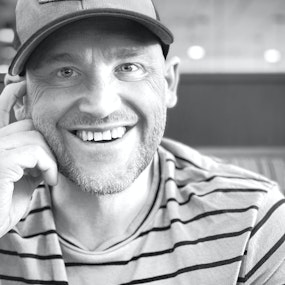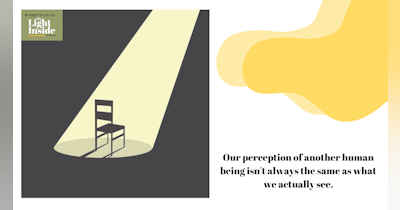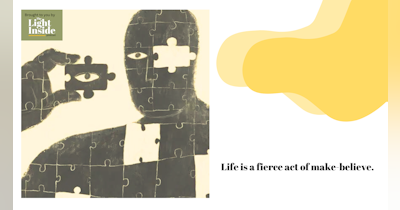Alex had always prided themselves on being what they believed to be an authentic, independent thinker—someone who formed their own beliefs and opinions, unbeholden to societal pressures or cultural conditioning. But lately, a nagging sense of doubt has crept into their consciousness, an existential unraveling that has called into question the very core of who they thought they were.
The concept of authenticity is complex, often obscured by the layers of cultural conditioning and societal expectations that shape our subconscious biases from an early age. Our core notions about authenticity contain heuristics (mental shortcuts) and logical fallacies, influenced by narratives ingrained in our upbringing and the environments we are exposed to.
In this case, a subconscious scenario about what it means to be true to a constructed self.
It began with little things at first—casual observations about how their tastes, values, and behaviors often aligned eerily with those around them, shaped by unseen forces. The music they enjoyed, the brands they coveted, even their political leanings—all seemed to be subtly influenced by their environment and upbringing in ways they had never truly confronted before.
Selective inference: where we unconsciously prioritize information that confirms our existing beliefs while discounting contradictory evidence, further distorts our understanding of authenticity, reinforcing preconceived notions while nullifying genuine experiences that challenge those notions.
Extensive research underscores the remarkable variability of human behavior across diverse situations, highlighting the powerful influence of social context and personal beliefs on our actions.
As Alex delved deeper into research on cultural relativism and the constructed nature of identity, a chilling realization took hold: their perception of an authentic, freely-chosen self was likely an illusion.
The beliefs, preferences, and biases they had long assumed were uniquely their own were in fact deeply rooted in the invisible tentacles of cultural and societal conditioning.
An existential crisis gripped Alex. If their sense of self was merely a dynamic interplay between external influences and random associations, what did that mean for free will? For personal agency? The foundations upon which they had built their entire identity seemed to crumble beneath the weight of this newfound understanding.
Yet, the introspection illusion—the subconscious bias wherein we overestimate the accuracy and depth of our conscious awareness —impedes our ability to truly assess our inner worlds and core characteristics objectively.
In their darkest moments, Alex felt like a mere vessel, a hollow shell puppeteered by the forces of culture and circumstance. Their thoughts, emotions, and behaviors felt like echoes of a collective unconscious, dictated by the environments and narratives they had been immersed in since birth.
Interestingly enough, they were.
As we navigate the complex labyrinth of this illusion of authenticity, we inevitably confront the pervasive societal constructs and cognitive biases that shape and inform our perceptions, striving to embrace the multifaceted and fluid nature of human identity beyond superficial cultural contextualization.
Yet, even as this crisis threatened to consume them, a faint glimmer of hope emerged. Perhaps authenticity was not about escaping the inescapable influences of culture and society, but about consciously acknowledging and navigating them. By recognizing the inherent biases and distortions that shape our perceptions, could one chart a path towards a more nuanced, ever-evolving sense of unified self that was ever-whole within the conscious collective?
The experiences and perceptions that shape our sense of self are not originally or inherently "ours" in isolation, they exist instead as ours collectively. Therefore, we are profoundly shaped by the cultural and societal influences that surround us from the moment we are born into this world. From the language we speak to the values we uphold, these external environmental factors play a pivotal role in molding our fundamental understanding of the world and our perceived place within it.
Alex realized that the journey towards authenticity was not a destination, but an ongoing process of learning, unlearning, questioning, and embracing the multifaceted nature of human experience. It was an acceptance that their identity was neither fixed nor entirely consciously-determined, but a fluid tapestry woven from the threads of cultural narratives and personal introspection.
Our personal identity, therefore, is not a fixed and immutable core aspect of who we are. It is exactly who and what we are together, interactively. Instead, it is a dynamic and ever-evolving construct that is constantly influenced and reshaped by the powerful cultural and societal forces around us throughout consciousness.These external factors contribute substantially to the formation of our beliefs, attitudes, behaviors, values, goals, and aspirations that we consider central to our constructed selves.
With this newfound perspective, Alex began to approach life with a greater sense of humility and open-mindedness. They embraced the diversity of perspectives and experiences around them, recognizing the limitations of their own biased lenses. And in doing so, they found a deeper sense of connection to the shared human experience—a collective conscious discovery that transcended the illusion of a rigidly defined, isolated self.
Recognizing this deep interconnectedness between our conscious experiences and the broader social context is crucial to truly understanding and appreciating the complexity of our constructed identities. We are intrinsically woven into the cultural lexicon and narratives inherited from the past, regardless of how we consciously perceive them.
The principle of cultural relativism highlights the idea that there are no absolute, universal truths or standards when it comes to human experiences and perceptions. Instead, they are inevitably shaped by the diverse cultural norms, beliefs, and value systems that exist across various societies and groups.
A significant problem arises from the fact that much of this influential interaction between us and our environment slips under our conscious awareness, as it is either missed entirely or unconsciously discounted due to cognitive biases.
By discounting the inherent nature of these cultural and environmental factors, we unwittingly reinforce biased beliefs or rely on mental heuristics to construct an idealized sense of identity that we subjectively perceive as an authentic yet flawed construction.
These unconscious influences of cultural and environmental factors can profoundly impact our thoughts, emotions, and behaviors without us even realizing their power over us. Our beliefs, preferences, and biases can be deeply rooted in these external influences, shaping our worldviews and driving our decisions in ways that may contradict our subconscious values of authenticity.
This understanding of cultural relativism challenges our preconceived notions of what is "normal" or "right," and encourages us to embrace diversity, respect different perspectives, and remain open to continually learning and unlearning throughout our journey of conscious discovery.
Ultimately, consciousness itself is a constantly unfolding, collective aspect of who and what we are as human beings. Our identities are intricately woven into the constructed cultural lexicons around us, inevitably filtering our interpretations of one another through the lenses of our unique yet inherently biased perceptions.
Despite the shortcomings of mental biases, distortions, and selective reinforcements, the idealized notion of our authentic selves is neither more nor less than a multifaceted facade—a dynamic interplay between cultural indoctrination and random associations that defies rigid categorization.
Alex, in this scenario, is a fictionalized character constructed to add meaning to conscious experiences. This is similar to what we experience in our conscious lives. Value exists within the context of meaning.
The article playfully uncovers how our idea of being "true to ourselves" is like a whimsical mirage, shaped by the colorful influences of society and culture, with Alex's journey serving as a relatable, metaphorical rollercoaster through the carnival of identity, reminding us that the ride to authenticity is a wild, ongoing adventure of learning, unlearning, questioning, and embracing the kaleidoscope of human experiences. This is truly a ride with no end in sight or any obvious point of origin.



